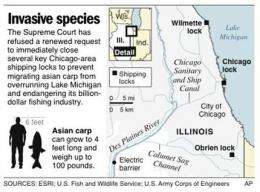6-week search finds no Asian carp near Chicago

(AP) -- An initial six-week mission to catch and kill Asian carp lurking on the Great Lakes' doorstep turned up none of the despised fish, suggesting few if any have eluded an electric barrier designed to block their path to Lake Michigan, officials said Monday.
Beginning in mid-February, teams of biologists and commercial fishermen combed a network of Chicago-area rivers and canals where Asian carp DNA has been detected in numerous spots over the past year. They spread netting across large areas and used electric stunning prods where they believed the carp were most likely to gather, said Chris McCloud, spokesman for the Illinois Department of Natural Resources.
The operation yielded more than 1,000 common carp, a similar number of gizzard shad and a few other varieties but no silver or bighead carp - natives of Asia that have infested sections of the Mississippi and Illinois rivers plus the Chicago waterways south of the electric barrier, some 25 miles from Lake Michigan.
"What this tell us is if they are present above the barrier, they are in very low numbers as we've said before," McCloud said.
The barrier's effectiveness is a key issue in the debate over whether to close shipping locks in the waterways to keep the invasive carp from entering Lake Michigan, as sport fishing interests and most states along the Great Lakes would like.
Notoriously prolific, Asian carp can grow as large as 4 feet long and 100 pounds and eat up to 40 percent of their body weight daily in plankton, the base of the lakes' food chain. Scientists say that if the species spreads across the lakes, it could damage the $7 billion fishing industry.
Recreational boating also could suffer. Silver carp are known to become startled by motors, leaping from the water and colliding with boaters.
Illinois and the Obama administration oppose closing the locks, siding with Chicago barge and tour boat companies who say doing so would devastate their businesses. They contend the electric barrier is performing well and closing the leak-prone locks wouldn't be a foolproof measure.
The U.S. Supreme Court last week refused for a second time Michigan's request to order the locks closed.
The sampling operation was conducted by the Illinois DNR, the U.S. Fish and Wildlife Service and the U.S. Army Corps of Engineers. Their crews set more than 5 miles of netting in the main channels of the Chicago Sanitary and Ship Canal, the Des Plaines River and other waterways, plus barge slips, marinas and other likely carp hideouts.
Early on, the teams focused on areas where warm water was being discharged from industrial operations, including power plants and wastewater treatment plants. Fish tend to congregate near warmer water during winter. As spring approached and ice receded, the search area was broadened.
To make sure they were using effective techniques, the crews also searched for Asian carp below the electric barrier. They nabbed 36 silver carp and four bighead carp near Starved Rock Lock and Dam, about 70 miles downstream.
Ashley Spratt, a spokeswoman for the fish and wildlife service, acknowledged the failure to catch any Asian carp above the barrier didn't necessarily mean none were there.
"They are hard to catch and this is a big area we're looking at," she said.
John Sellek, a spokesman for Michigan Attorney General Mike Cox, said Monday that although no Asian carp were found, Michigan still wants the locks closed.
"What did they expect? (Illinois') own court filings say they are not likely to catch Asian carp using nets or electro-fishing," Sellek said.
Biologists plan to continue searching over the next three months as part of a $78.5 million Asian carp control strategy.
"Intensifying our sampling and monitoring efforts in high-risk areas for Asian carp provides us with critical data on population dynamics, potential range expansion and movement of the species," said Charlie Wooley, deputy regional director for the fish and wildlife service.
©2010 The Associated Press. All rights reserved. This material may not be published, broadcast, rewritten or redistributed.














